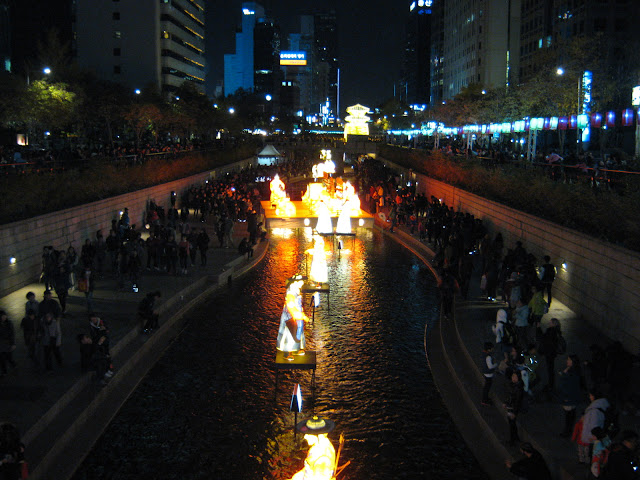- returned to Korea
- grew a beard
- learned how to play pinochle
- started playing cards with the fellas on Thursday nights
- rode the mugunghwa (the Korean diesel train)
- successfully completed my first NaNoWriMo
- explored five new cities
- sent socks to the D.P.R.K. via weather balloon
- familiarized myself with the Seoul subway system
- ate Jordanian food
- smoked a real Cuban cigar
- got interviewed by Reuters
- took a night cruise on the Han River
- went to the Seoul Zoo
- survived a typhoon (or two)
- climbed a 2,426-foot mountain
- took an interest in jazz
- filled up my liquor cabinet
- spent three hours at the National Museum of Seoul (and that was just the first floor)
- went bike-riding in the snow
- (finally) located the best hamburger in Seoul
And here's what I'm hoping to accomplish next year:
- become proficient in Korean
- pay off my credit card debts
- get some fiction published, including that NaNoWriMo novel
- lose the gut; improve flexibility and core strength
- ride the saemaeul (the second-fastest class of train in K-Land)
- foment good daily habits, such as stretching, exercising, yoga, writing, reading, and intellectual improvement
- change my Facebook cover photo only once a month
- acquaint myself with basic physics
- read 30 books
- bathe in both the Yellow Sea and the Sea of Japan
- visit the Busan Aquarium
- go to a jimjilbang (a Korean bathhouse)
- ride every line on the Seoul Metro
- look into Duke Ellington, Louis Armstrong, Earl Hines, King Oliver, Sidney Bechet, Fats Waller, Count Basie, Miles Davis, and Thelonius Monk, and thereby augment my jazz collection
- find the best taco in Seoul
There's an item on this list that I haven't mentioned, because it seems apropos to discuss it in greater detail.
I'm going to make this blog more professional.
In 2009, when my English friend (known only as "A") told me to start a blog and use it as a repository for my travel writing endeavors, I didn't quite take his advice to heart. He intended for me to create a sort of electronic portfolio, a reference guide for prospective employers. That was and still is a sound idea. For almost four years now I've been using this blog as a creative outlet, but not as a vehicle to further my writing career.
That changes in 2013. I'm going to specialize. Instead of splattering myself all over the place and writing about booze, flying, literature, writing, and travel, I'll just do travel instead. Maybe the occasional cocktail review, we'll see. I'm mulling over the idea of starting up a secondary and perhaps even a tertiary blog to cover my aviation and literary pursuits, but those are still in the planning stages. Henceforth, however, "the Sententious Vaunter" shall cover travel, and travel only. You may want to sign off now if you ain't interested.
Also, in lieu of the new year and the overhauls intended for this blog, I've set up a new profile picture, one that's actually of me and not my favorite fictional character. So here I am, in all my glory: my favorite lumpy hat, my new and extra-fluffy scarf, my old military-style winter coat, and in my favorite chair. Blog heaven.





































